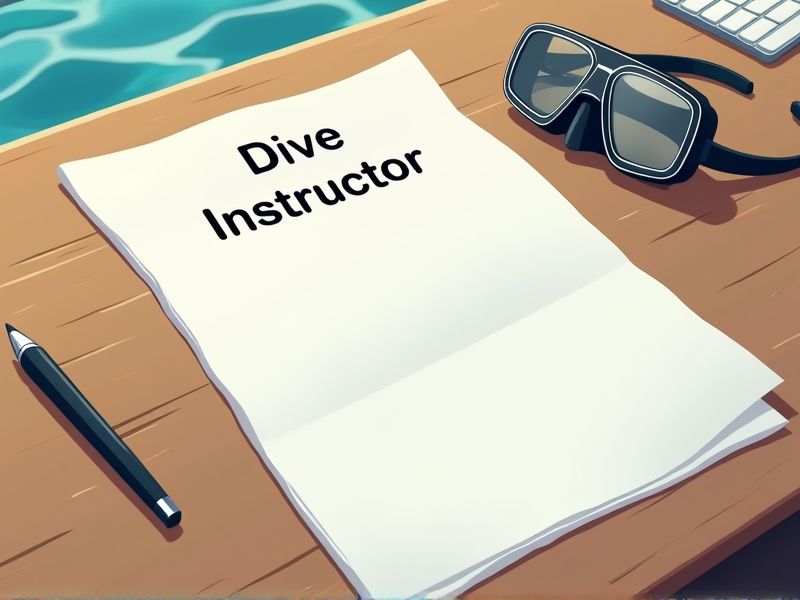
Dive instructors play a crucial role in ensuring both the safety and enjoyment of recreational divers, necessitating a comprehensive understanding of diving protocols. Obtaining specific certifications not only enhances a dive instructor's knowledge but also provides validation of their skills to potential employers and students. These credentials address various aspects of diving, including emergency response, environmental awareness, and technical skills. Key certifications vital for dive instructors include those covering rescue techniques, dive technology, and marine conservation awareness.
Open Water Diver Certification
Open Water Diver Certification provides foundational skills essential for safe diving practices. Without this certification, aspiring dive instructors lack the basic knowledge required to teach others. The certification ensures that instructors have firsthand experience and understanding of the diving environment. As a prerequisite, it standardizes the level of competence necessary to maintain safety and quality in dive instruction.
Advanced Open Water Diver Certification
Having an Advanced Open Water Diver Certification indicates a diver's capability to handle more challenging diving conditions, enhancing their knowledge and skills. Dive instructors must often guide students through complex underwater environments, requiring this advanced expertise. The certification helps instill confidence in students, knowing their instructor possesses extensive training. Many diving schools and organizations mandate this certification level to ensure instructors meet safety and educational standards.
Rescue Diver Certification
Rescue Diver Certification enhances a diver's ability to manage stress and prevent emergencies, crucial skills for an effective Dive Instructor. By undergoing this training, instructors gain the capability to handle unforeseen underwater situations, enhancing safety for themselves and their students. It also builds confidence and leadership qualities necessary for instructing and guiding new divers. Dive organizations often require this certification to ensure instructors possess comprehensive safety and emergency management proficiency.
Divemaster Certification
Obtaining a Divemaster Certification is necessary for a Dive Instructor because it provides a comprehensive understanding of supervising and guiding dives safely. The experience gained in the Divemaster program hones leadership skills crucial for managing groups underwater. This certification ensures familiarity with emergency procedures and enhances problem-solving abilities. Dive instructors with this background are recognized for higher competency and professionalism in the diving industry.
Instructor Development Course (IDC) Certification
Instructor Development Course (IDC) Certification equips dive instructors with advanced teaching methodologies, ensuring they can effectively convey complex diving skills to students. With the IDC Certification, instructors meet industry standards, enhancing their credibility and increasing employment opportunities in the global diving industry. This certification emphasizes safety, preparing instructors to respond adeptly to emergencies and minimize risks during dive sessions. IDC also provides a structured framework for instructors to develop leadership skills, fostering a supportive learning environment.
Scuba Instructor Certification
Scuba Instructor Certification ensures that dive instructors possess the necessary skills and knowledge to safely guide students underwater. The certification process covers critical areas such as emergency response, dive planning, and equipment management, which minimizes the risk of accidents. Certified instructors adhere to standardized teaching protocols, enhancing consistency and quality in scuba education across different locations. Dive agencies and resorts often require certification as it assures them of an instructor's competence and credibility, which protects their reputation and attracts more clients.
Emergency First Response (CPR/AED and First Aid) Certification
Having an Emergency First Response (CPR/AED and First Aid) Certification equips dive instructors with essential life-saving skills critical in emergencies. This certification ensures a dive instructor is prepared to respond to cardiovascular incidents and accidents in aquatic environments. Employers and regulatory bodies often mandate it to meet safety and legal standards within the diving industry. Possessing this certification can increase a dive instructor's employment opportunities by validating their capability to handle emergency situations effectively.
Enriched Air Nitrox Certification
Enriched Air Nitrox Certification allows dive instructors to increase the bottom time for their students, which enhances the learning experience. Higher oxygen content in nitrox reduces nitrogen absorption, decreasing the risk of decompression sickness during repetitive or longer dives. Dive instructors with this certification can offer a wider variety of dive courses, appealing to students interested in specialized training. Holding the certification often leads to more employment opportunities, as dive centers frequently seek instructors who can teach a range of courses.
Deep Diver Specialty Certification
Dive instructors need Deep Diver Specialty Certification to safely guide divers in deep water environments, minimizing the risk of decompression sickness. This certification provides advanced training on the use of specialized equipment and enhanced buoyancy control, crucial for deep dives. It also equips instructors with the knowledge to manage the unique physiological challenges associated with increased pressure at depth. By obtaining this certification, dive instructors enhance their professional credibility and expand the range of diving courses they can offer.
Underwater Navigation Specialty Certification
The need for an Underwater Navigation Specialty Certification for dive instructors arises from the complexity of guiding divers safely in environments where visibility is limited, ensuring both the instructor and divers maintain orientation. Lack of proper navigation skills can lead to disorientation, raising risks of separation from the group and increased chances of underwater incidents. Mastery in underwater navigation enables instructors to impart critical skills to their students, making diving experiences safer and more enjoyable. Enhanced navigation skills in instructors foster confidence in their students, encouraging them to explore new diving locations with minimal risk.
Summary
You might observe increased credibility when a Dive Instructor acquires additional certifications. These certifications can equip instructors with advanced skills and knowledge, enhancing their teaching capabilities. More certifications often lead to greater job opportunities and potentially higher salaries. A more comprehensive understanding of the dive environment ensures you receive safer and more engaging diving experiences.
